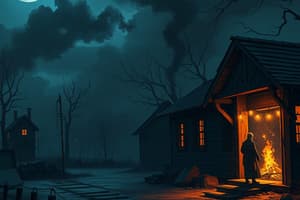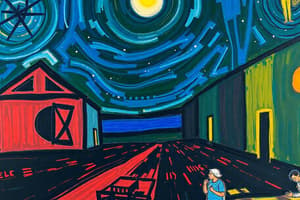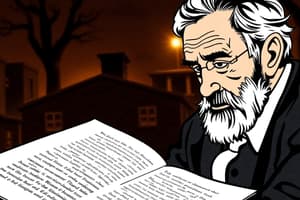Podcast
Questions and Answers
Immediately after the Jews were unloaded from the train, what do the German officers do?
Immediately after the Jews were unloaded from the train, what do the German officers do?
They separate the men, children, and women.
What did Dr. Josef Mengele do when the men marched before him?
What did Dr. Josef Mengele do when the men marched before him?
Mengele asked their age, health, and profession to sort out the young, weak, and useless.
What did another prisoner say would happen to Elie's group?
What did another prisoner say would happen to Elie's group?
They would be burned.
What did the older people counsel the younger men who wanted to rush the guards?
What did the older people counsel the younger men who wanted to rush the guards?
What did Elie witness while standing in line?
What did Elie witness while standing in line?
What was Elie's reaction to what he saw?
What was Elie's reaction to what he saw?
How is the artistry achieved when Wiesel and his father approach the inferno?
How is the artistry achieved when Wiesel and his father approach the inferno?
What did Elie revolt against?
What did Elie revolt against?
What phrase does Elie use to emphasize his point?
What phrase does Elie use to emphasize his point?
List the things that Wiesel says he shall never forget.
List the things that Wiesel says he shall never forget.
What images are used frequently throughout 'Night'?
What images are used frequently throughout 'Night'?
What happened to Elie and his father after they were spared from the flames?
What happened to Elie and his father after they were spared from the flames?
What natural sign marked the beginning of the next day after Elie's first night at Auschwitz?
What natural sign marked the beginning of the next day after Elie's first night at Auschwitz?
Why did Elie berate himself so severely?
Why did Elie berate himself so severely?
Where was Elie and his father marched to?
Where was Elie and his father marched to?
What was Elie's first impression of Auschwitz?
What was Elie's first impression of Auschwitz?
What was unusual about the prisoner in charge of their barracks?
What was unusual about the prisoner in charge of their barracks?
What happened to the prisoners during a last step in their admission process?
What happened to the prisoners during a last step in their admission process?
Who did Elie meet after several days at the camp?
Who did Elie meet after several days at the camp?
What did Stein want?
What did Stein want?
How did Elie respond to Stein's request for information?
How did Elie respond to Stein's request for information?
How did Elie and his father avoid being transported?
How did Elie and his father avoid being transported?
Why was the prisoner in charge of their block replaced?
Why was the prisoner in charge of their block replaced?
Why did Stein disappear?
Why did Stein disappear?
How did the Jews see their religion and how did Elie feel about God?
How did the Jews see their religion and how did Elie feel about God?
Finally, where were Elie and his father moved?
Finally, where were Elie and his father moved?
Flashcards are hidden until you start studying
Study Notes
Arrival at Auschwitz
- Upon arrival, German officers separated men, women, and children.
- Men marched before Dr. Josef Mengele, who assessed them based on age, health, and profession to determine who was deemed "useless."
Immediate Threats
- A prisoner warned Elie's group that they would be burned.
- Older prisoners advised against rushing the guards, encouraging them to hold onto hope.
Traumatic Experiences
- Elie witnessed horrific acts, including babies being thrown into flames, leading to feelings of disbelief and numbness.
Emotional Impact
- Elie's struggle with his faith intensified, culminating in a revolt against God.
- The phrase "Never shall I forget…" was frequently repeated to emphasize key traumatic memories.
- Elie listed what he would never forget: the first night, smoke, children, faces, and flames.
Imagery and Symbolism
- Consistent imagery throughout "Night" includes themes of night, flames, darkness, and despair, contrasting with the sun.
Processing at Auschwitz
- Elie and his father were stripped, shaved, and given prisoners’ clothing, marking their loss of identity.
- The natural sign of the morning star signified the beginning of a new day, as Elie felt he was no longer a child.
Regret and Self-Reflection
- Elie expressed self-reproach for his inaction during the initial chaos of arrival and processing.
Life in the Camp
- Elie’s first impression of Auschwitz was that it seemed better than Birkenau, featuring two-story cement buildings and gardens.
- The prisoner in charge of their barracks was unusually optimistic and treated the inmates with respect.
Identity Stripped Away
- Prisoners underwent a final admission step, being tattooed with numbers, signifying the complete loss of personal identity.
Connections and Lies
- Elie encountered Stein, his relative, and lied about the well-being of his family due to incomplete knowledge.
- To avoid being transported, Elie and his father did not sign up as skilled workers.
Shifts in Leadership
- The prisoner in charge of their block was replaced for being too kind, reflecting a system that viewed humanity as a liability.
The Despair of Information
- Stein disappeared after learning the truth about his family's fate, highlighting the pervasive despair among the prisoners.
Crisis of Faith
- The Jewish prisoners grappled with their faith, claiming their God worked in mysterious ways, while Elie ceased to pray and questioned divine justice.
Final Movement
- Elie and his father were ultimately moved to Buna, continuing their harrowing journey through the Holocaust.
Studying That Suits You
Use AI to generate personalized quizzes and flashcards to suit your learning preferences.




